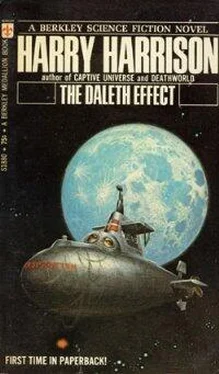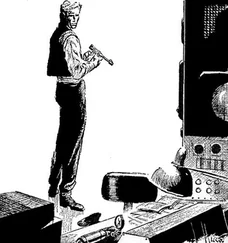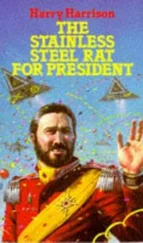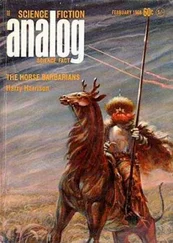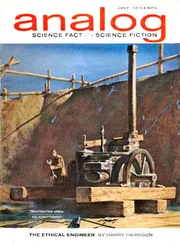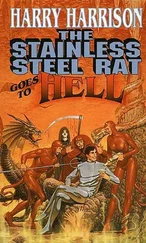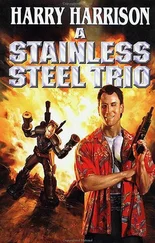“I had one beer with lunch—and a flat Swedish beer at that I ought to report you for blackmail.” But Skou pulled up anyway and they changed seats. He said nothing when Nils put his foot flat on the floor and screamed the engine up through the gears.
There was hardly any traffic on the road and the visibility was good, with the setting sun trying to get through the clouds. The Humber cornered like a sports car, and Nils was an excellent driver, going fast but not taking chances. Machines were something he knew how to cope with.
It was almost dark when they reached Halsingborg and bumped over the railroad tracks to the ferry terminal. They began a new lane and were the first car aboard the next ferry, stopping right behind the folding gate at the bow of the ship. Skou got on line to buy a package of tax-free cigarettes during the brief crossing, but Nils stayed in the car. The drive, short as it was, had helped. He watched the lights of the castle and the Helsingor harbor come close and thought about the work that was nearing completion on Galathea.
The guard at the shipyard gate recognized Skou and waved them through.
“How is security?” Nils asked.
“Secrecy is the best security. So far the spies have not connected the much-publicized hovercraft with the highly secret Daleth project. So the guards stationed here—and there are enough of them—are not in evidence. You saw one of them, selling hot dogs from that cart across the street”
“The polsevogn! Does he get to keep his profits?”
“Certainly not! He’s on salary.”
They parked in their usual spot behind the buildings, and Nils used the office to change into his boiler suit. The yards were silent, except for the work going on around the Galathea which continued on a twenty-four-hour basis. Arc lights had been switched on, lighting up the rusted, unfinished hull. This was deliberate subterfuge: the sandblasting and painting was being put off until the very last moment.
Inside, it was very different. They climbed the ladder and entered through the deck airlock. The lights came on when the outer door was closed. Beyond the inner door stretched a white corridor, linoleum floored, walled with teak paneling. The lighting was indirect and unobtrusive. Framed photographs of the lunar landscape were fastened to the walls.
“Pretty luxurious,” Nils said. On his last visit the corridor had been red-painted steel.
“Most of it is from the original specifications,” Ove Rasmussen said, coming in behind them. “All of the interior was designed and contracted for. There had to be some changes, of course, but in most of the cabins and general areas there was very little. They filed ^way the pictures of castles and thatched houses and put up these Moon shots instead. These are the prints the Soviets sent in gratitude* Come with me, I have a surprise for you.”
They went along a carpeted passage lined with cabin doors. Ove pointed to the last one and said, “You first, Nils.” There was a brass plate let into the teak of the door that read Kaptajn. Nils pushed it open.
It was large, part office and part living room, with a bedroom opening off of it. The dark blue carpet was flecked with a pattern of tiny stars. Over the desk, which was an ultra-modern palisander-and-chrome construction, were mounted a bank of instruments and a row of communicators.
“A little different from flying SAS,” Ove said, smiling at Nils’s wide-eyed appreciation. “Or even the Air Force. And look there, your first command, in true nautical tradition.”
Over the couch was a large color photograph of the little submarine Blaeksprutten sitting on the lunar plain. The distant Earth showed clearly in the background.
“Another gift from the Soviets?” Nils laughed. “It’s all tremendous.”
“Personal present from Major Shavkun. He took it beiore they came over, you remember. See, all three of them have signed it.”
“A little paint on the outside and Galathea looks ready to go. Is it? How does the drive department progress?”
“The fusion generator is aboard and has been tested. A lot of small items are still to be taken care of—nothing important, silverware, things like that. And the Daleth drive, of course. It’s built and has been bench tested at the institute, and it will go in last.”
“The very last thing,” Skou said. “We want to put as little temptation in the way of our spies as is possible. We have the university under a heavy military guard, so I imagine they are focusing their interest there.” He smiled broadly. “All of the hotels are full. They bring in plenty of foreign exchange. It is a new tourist industry.”
“And you’re in security heaven,” Nils said. “No wonder you are driving a new Humber. Where is Arnie Klein?”
“He has been living aboard for the last couple of weeks,” Ove said. “Ever since the bench tests were completed on the Daleth unit. He has been working with my fusion generator and, I swear, he has already made at least five patentable improvements.”
“Let’s get down there. I want to see my engine room.” He looked around once more, admiringly, before he closed the door behind them. “All of this takes a bit of getting used to. It is beginning to be a bigger job than I ever realized.”
“Relax,” Ove told him. “It’s a ship now, but it is going to be a big flying machine once you lift off. Sort of a super seven forty-seven—which I know you have flown. You’ll agree that it is a lot easier to teach you to fly a ship than it is to teach a ship’s captain to fly anything at all.”
“There is that—What’s wrong?”
Skou had stopped dead, nostrils flared with anger.
“The guard, he should be there in front of the engine-room door. Twenty-four hours a day.” He began to run heavily, with a bobbing motion, and pushed against the door. It would not open.
“Locked from the inside,” Nils said. “Is there another key?”
Skou was not wasting time looking for a key. He drew a short thick-barreled revolver from a holster inside the waistband of his trousers and jammed it against the lock. It boomed once and jumped in his hand. Smoke billowed out and the door opened. Just a few centimeters, something was blocking it. Through the opening they could see the blue-clad legs of the guard on the floor just inside, his body pressing against the door. He slid along, unprotest-ing, when they pushed harder to get the door open.
“Professor Klein,” Skou called, and jumped in over the guard’s body. Three rapid shots boomed out and he kept on going, falling to the floor. He had his gun raised but did not return the fire. “Stay back,” he called to the other two, then climbed to his feet.
Ove hesitated but Nils dived in, rolling over the guard without touching him. He sat up just in time to see a flicker of motion as the large engine-room airlock closed. He scrambled up, ran to it and pulled strongly but it would not budge.
“Dogged shut from the other side! Where is Arnie?”
“With them. I saw him. Two men, carrying him. Both armed. Damn!” Skou had his pocket radio out, switched on, but nothing except static was coming from it.
“Your radio won’t work in here,” Ove reminded him, bending over the ^uard. “You’re surrounded by metal. Get up on deck. This man is just unconscious, he’s been hit by something.”
The other two were past him and gone. There was nothing he could do now for the guard. Ove jumped to his feet and ran after them.
Both airlock doors were open and Skou, on the deck outside, was shouting into his radio. The results were almost instantaneous: he had been prepared for this emergency too.
All of the shipyard lights came on at once, including searchlights on the walls and the arcs mounted on the cranes and ships under construction. The yard was as light as day. Sirens sounded out in the harbor and searchlights played over the black water as two police boats sealed off that side. Nils scrambled down the ladder and jumped the last few meters to the ground, hit running, around die turn of the hull to the stern where the airlock was. The outer door gaped open and he had a quick glimpse of dark figures. He grabbed the arm of a policeman who ran heavily up.
Читать дальше
